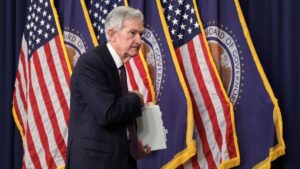Is Jerome Powell Running Out of Time? A Deep Dive into Federal Reserve Policy
At a recent press conference, U.S. Federal Reserve Chair Jerome Powell found himself at the center of heated discussions regarding monetary policy. With President Trump coining the term "Too Late" to describe Powell, many are left pondering whether Fed leaders will once again fall into the age-old trap of inertia when swift action might be necessary.
Historical Context: A Pattern of Hesitation
Historically, the Federal Reserve has been criticized for its slow response to changing economic conditions. Remember Arthur Burns during the stagflation crisis of the 1970s? Or Alan Greenspan’s notorious failure to act swiftly during the dotcom bubble? These instances highlight a troubling precedent; central bank leaders often wait for more compelling data before making decisive moves. Many economists predict that Powell might find himself wearing the same "Too Late" label, especially given the unique challenges facing the economy today.
As Dan North, a senior economist at Allianz Trade North America, points out, “the Fed is always late both ways.” The aversion to make bold decisions, especially when economic data is mixed, often results in missed opportunities to stabilize the economy before it tiptoes into recession.
The Balancing Act: Inflation and Employment
As Powell navigates the dual mandates of full employment and low inflation, he faces mounting pressure. With the recent waves of tariffs imposed by Trump raising fresh concerns, the Fed finds itself in an unpredictable environment where the risks are skewed on both sides.
Economists suggest that maintaining the current rates could be the most prudent course of action in these turbulent times. North indicates that Powell’s reluctance to act could be a result of the understandable desire to avoid errors in judgment; “One way or another it’s going to be a mistake,” he asserts, highlighting the gravity of the decision-making process at the Federal Reserve.
Trump’s Calls for Rate Cuts
Despite an economy that, according to Powell, remains "solid," Trump’s insistence on rate cuts complicates matters. In an animated Truth Social post, he dismissed Powell as a "FOOL," arguing that the economy would thrive regardless of the Fed’s actions. However, even as certain inflation indicators seem favorable, the economic ramifications of the tariffs have yet to materialize fully, leading to concerns that the pros and cons are still murky.
Consumer sentiment is reportedly souring, with about 90% of S&P 500 companies voicing concerns over tariffs during quarterly earnings calls. This paints a picture of a more complex landscape than Trump would like to admit, even as Powell plows forward, maintaining optimism about labor markets.
The Dilemma of Pre-emptive Action
Powell has decisively pushed back against the notion of preemptive cuts, offering the rationale that “there’s no real cost to waiting.” However, that viewpoint has sparked criticism. Krishna Guha from Evercore ISI cautions that this stance could backfire if economic conditions shift more rapidly than Powell anticipates. “If they’re waiting for the labor market to confirm whether they should cut rates, by definition, they’re too late,” warns Joseph LaVorgna, chief economist at SMBC Nikko Securities.
Indeed, an old Wall Street adage warns that “the labor market is the last to know” when a recession is on the horizon. For a Fed already scrutinized for indecisiveness, getting led by the labor market might further entrench this "Too Late" label into Powell’s legacy.
Conclusion: The Waiting Game
As we move forward through these uncertain economic waters, it’s clear that the Federal Reserve is walking a tightrope. Forgetting historical patterns could cost Powell dearly if he doesn’t act swiftly enough once the data turns unfavorable. Economic history suggests that when the Fed is faced with tariff-related risks and mixed signals from key indicators, hesitancy might only exacerbate the situation.
At Extreme Investor Network, we emphasize the importance of being proactive in these fluid financial environments. Understanding the nuances of monetary policy can empower investors and provide insights into navigating an uncertain market. Keep checking our blog for up-to-the-minute analysis and strategies tailored to thrive even in challenging economic climates.
By providing a comprehensive view on Powell’s challenges and Trump’s economic pressures, Extreme Investor Network stands as a go-to resource for understanding crucial financial dynamics that could impact your investments.

